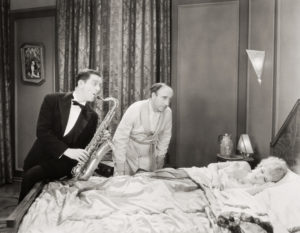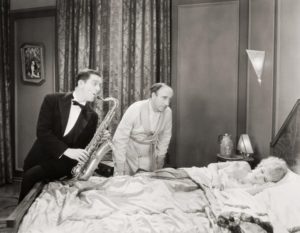Most of us are not getting enough...
I don’t know about you, but if I’m not getting enough sleep I get pretty grumpy, pretty quickly and I find that simple problem solving becomes rather complicated.
Did you know we spend about 25 years of our life asleep?
A report released in April 2021 by the Sleep Health Foundation estimates that poor sleep costs Australia $14.4 billion each year in financial costs, with a further $36.6 billion in non-financial costs related to loss of well-being.
Rise and try to shine: the social and economic costs of sleep disorders reports that around 1 in 10 Australians have a sleep disorder that can have a serious effect on their health, well-being, safety and productivity.

Sleep – why do we need it?
Why then do we need to sleep? Scientists have been exploring the question for some time and whilst there is still so much to learn about the complexities of our fabulous brains, a few theories have been researched.
Restoration theory – sleep provides the body with the opportunity to repair and rejuvenate itself. Studies show that muscle growth, tissue repair, protein synthesis and growth hormone release occur mostly or only during sleep. That sounds a lot like accelerated ageing to me…
Brain plasticity theory – ooh, I love this stuff. Sleep positively impacts on the structure and organisation of our brains. It seems if we don’t get enough sleep, this has a profound effect on our ability to perform tasks and learn new things.
Want to make a positive change in your life? Get some quality zeds.
Sleep is also involved with the following processes:
- Anti-stress reactions and emotional soothing
- Detoxification
- Immune responses
- Growth and time-keeping
- Learning and memory acquisition
Also, if you are having trouble sleeping, it may impact on your ability to lose weight. BOOOOOOOOOO
I guess given that we spend a third of our life doing it, it’s worth doing it right!
What if you’re not getting enough?
We’re still talking about sleep Dames…
According to Australia’s Sleep Health Foundation chair, Professor Dorothy Bruck, if four out of every 10 Australians are suffering from inadequate sleep, half of those would be experiencing ongoing pathologically high levels of daytime sleepiness.
The cost of sleep deprivation is utterly alarming. ‘How alarming?’, I hear you ask… To be exact, 3,017 deaths in 2016-17 were estimated to have been partly caused by sleeplessness, including traffic and industrial accidents or as a consequence of heart disease or diabetes.
A normal night’s sleep has three main parts:
- Quiet sleep. This is divided into stages 1-4. Each stage becomes more deep. Quiet sleep is sometimes called deep sleep.
- Rapid eye movement (REM) sleep. REM sleep occurs when the brain is very active, but the body is limp, apart from the eyes which move rapidly. Most dreaming occurs during REM sleep.
- Short periods of waking for 1-2 minutes. This should occur every couple of hours.
And remember, about 1 in 3 of us feels dissatisfied with either our sleep quality or quantity.
Insomnia can be described as:
- Not being able to get off to sleep.
- Waking up too early. Sounding familiar…?
- Waking for long periods in the night.
- Not feeling refreshed after a night’s sleep.
If you’re having a rough time sleeping, it’s more likely you’ll be tired in the daytime, have reduced concentration, become irritable, or just not function well. Any of this resonating?
Sleepy bo-bos
The bedroom should be for sleep and sex. Yes indeed!
If you want to improve your sleep quality, ditch the technology. Looking at Ipads is akin to being in daylight and televisions, whilst prosaic, will interrupt your sleep.
Top tips to help you drop off (backed by science):
Personal habits:
- Fix a bed time and awakening time, even on weekends and holidays
- Skip the daytime naps
- Avoid alcohol 4-6 hours before bedtime
- Drink your caffeine in the morning
- Lose the heavy, spicy or sugary foods 4-6 hours before bed
- Exercise regularly (but not right before bed)
Sleeping environment:
- Use comfortable bedding
- Find a comfortable temperature setting for sleeping and keep the room well ventilated
- Block out all distracting noise
- Reserve the bed for sleep and sex
Getting ready for bed:
- Try a light snack before bed
- Practice relaxation techniques before bed (I have found the CALM app very helpful before bed)
- Don’t take your worries to bed
- Establish a pre-sleep ritual
More stuff:
- Ensure you get BRIGHT sun exposure regularly – it reminds the pineal gland of what to do
- Sleep in complete darkness or as close as possible to – get rid of the clock radio, even that light will impact your sleep
- Take a hot bath 90-120 minutes before hitting the hay – this increases your body temp. and when you get out it abruptly drops, signaling the brain that it’s time for zeds
- Get a salt lamp (orange glow). Turn this on at night if you need to get up for a ‘comfort stop’
- Get some sun in the morning if possible (we need more as we age). Bright light helps reset your circadian system
Does counting sheep work? Apparently not so much, it didn’t seem to work for Bert!
Here’s the thing Dames, according to the Sleep Health Foundation before we hit menopause about 30% of women will say they have sleep issues. During the transition, well apparently that increases two or three fold!
If you would like to know more about why sleep changes during ‘the change’, download the Insiders’ Guide, Sleepless in Seattle (it’s $89 and comes with a 30 minute consult) or ask for it next time you’re in the clinic. It’s packed with useful information and tips.
Remember, you should not be doing menopause alone. I’ve got your back Dame (and your front and all those new squidgy bits in between). If you haven’t done so already, book yourself in for an appointment so we can discuss which options are best for you and make a plan that’s just for you.
Until next time, keep being great. and know this:
“Anyone can escape into sleep, we are all geniuses when we dream, the butcher’s the poet’s equal there.” ~ Emile M. Cioran
Be kind to yourself.
Marnie
P.S If you haven’t already done so, make sure you download your FREE Survivor’s Guide to Menopause (did I say it’s free?).
P.P.S If you know someone who is struggling with all the changes, please share this with them.
